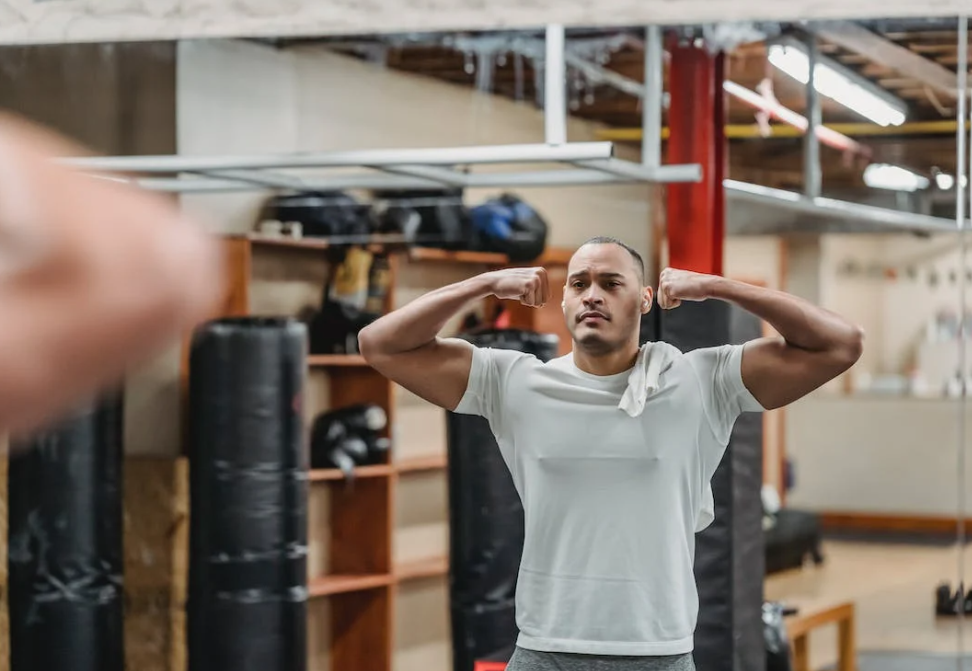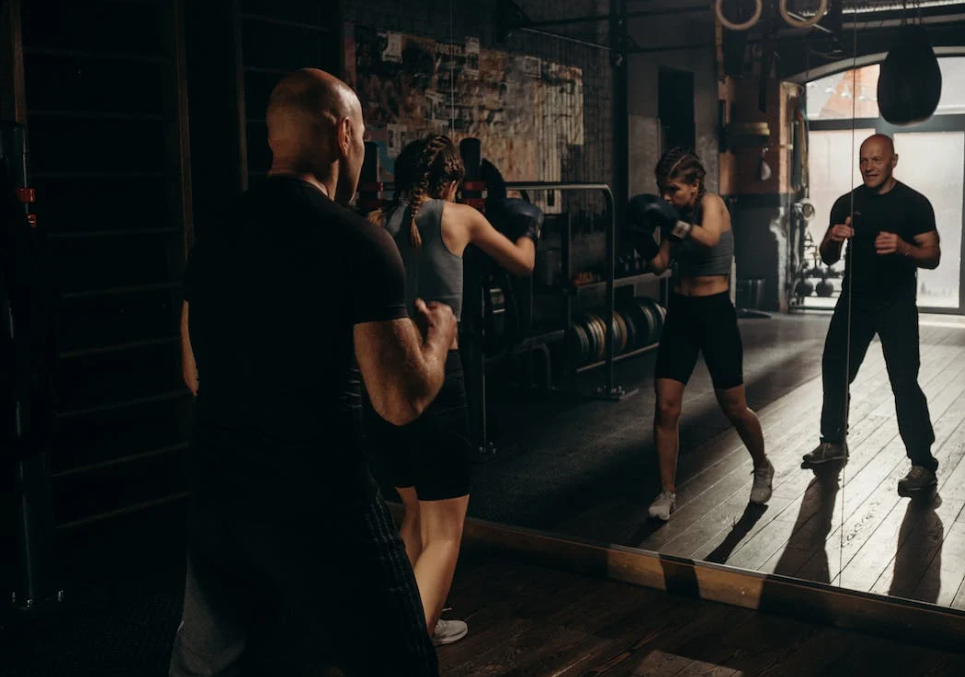Self Talk in Sport
Learn about the significant challenges that athletes face in their self-talk.

Selfpause Affirmation App
Download the app to get 1,000’s of affirmation meditations and everything you need to write, record and listen to your own.
Many athletes suffer from significant psychological challenges while playing their sport. While they may not be able to rely on sports psychologists or trainers, they can practice self-talk to cope with these challenges. Self-talk can help an athlete overcome these challenges and perform better in their sport. Below are some tips to help you make the most of your self-talk in sports.
Positive self-talk

One of the most important skills to develop when playing sports is positive self-talk. This skill can help you improve your athletic performance, boost your self-confidence, and increase your team’s morale. The technique can also help you pick up on other people’s positive traits. Athletes who use positive self-talk can make a big difference in their teammates’ and coaches’ morale as well. But learning to use positive self-talk requires practice. To begin, you need to identify your negative thinking patterns and re-train them to focus on the positive.
One study found that a positive climate helped competition athletes produce more positive self-talk than those who lacked it. The climate in which these athletes played was associated with a supportive task-involving climate, autonomy, and a social relationship supportive of autonomy. Conversely, a negative climate led to negative thoughts and somatic reactions related to insecurity and disempowerment, which were then transmitted through negative self-talk.
The study included participants from different sports and different levels of experience. Athletes were divided into two groups: a control group and an experimental group. The experimental group received a self-talk training program that lasted a week and a half, while the control group received no such training.
It is important to use positive self-talk during competition in order to remain confident and focused. Negative self-talk can increase anxiety levels and distract from your performance. Instead, try thinking of all the benefits of the game and your performance. Positive self-talk will make you feel great and improve your confidence.
Research shows that self-talk in sport can improve performance and boost your self-confidence. However, more research is needed to find out how self-talk works in different circumstances.
Self-critical self-talk
Self-critical self-talk in sport is a dangerous habit to develop. It not only leads to stress and tension, but it can also ruin friendships and cause athletes to avoid challenging situations. Instead, athletes should try to find ways to improve their self-talk. Here are some tips to improve your self-talk:
Be more positive. When you are in the middle of a tough situation, instead of focusing on the negative, use positive self-talk. Positive self-talk reinforces ability and choice, whereas negative self-talk emphasizes the negative consequences of a situation. Instead of thinking negatively about yourself, use positive self-talk to help yourself improve your performance and overcome mistakes.
Develop positive thoughts. Positive self-talk has a powerful effect on performance. Studies have shown that positive self-talk is more effective than negative self-talk. In addition, positive self-talk predicts future satisfaction. Conversely, negative self-talk increases anxiety and reduces overall performance.
Use System 2. Self-talk using System 2 is slower, but more intentional. The problem with System 2 is that it is more easily challenged by other thoughts. For example, a tired runner who is doubting his or her training may over-analyze his or her training. This can consume cognitive resources and limit the ability to react in the present situation.
The effect of self-criticism on performance is also apparent in RPM. While both positive and negative self-talk are effective for improving performance, they modulate the same areas of the brain differently. The reward-motivation network (RMPN) and task-positive network (TPN) are affected differently by the two types of self-talk. In addition, if participants are using self-criticism in order to improve performance, they may be less likely to experience cognitive fatigue.
Instructional self-talk

Instructional self-talk in sport can help athletes focus on the task at hand and reduce internal distractions. This technique helps athletes control their emotions, control worries and pressure, and stop themselves from abandoning the sport. Several studies have shown that this technique can increase athletes’ performance. However, there is a risk that the use of ST can cause negative effects, such as negative perceptions.
Self-talk can also influence the way an athlete views themselves and performs in competition. Studies have shown that it can increase confidence and increase motivation. In fact, a meta-analysis of self-talk studies conducted by researchers at the University of Thessaly found that self-talk interventions can help improve sport performance. These studies also noted that different types of self-talk cues work differently in different contexts. For example, instructional self-talk may help athletes improve fine motor skills, while motivational self-talk may be more effective when a sport requires endurance.
The effects of instructional self-talk in sport are long-term. They require some practice, but if you can apply the techniques properly, they may have an impact on your performance. For example, a tennis player may use a self-talk cue to remind themselves to focus on their stance when hitting the ball. If you use this technique with the ball in your hands, you’ll be more likely to hit the ball accurately.
The use of self-talk is a common tool for athletes to improve performance. However, it’s crucial to choose the type of self-talk that suits your goals. The right kind of self-talk can help you maintain good form, stay motivated, and remember your training.
Autonomous self-talk

Autonomous self-talk is a key component of athletes’ performance and their ability to focus during competition. It can also help them manage anxiety and stay confident. Autonomous self-talk is also an important factor in predicting athletes’ performance. Studies have shown that athletes who feel they are autonomous during competition are more likely to follow instructions during competition and will have a higher degree of concentration.
Research has also shown that experienced athletes use more self-talk than do newcomers. In one study, athletes who used positive self-talk to improve their performance were able to improve their 100-meter sprint times. This finding has been confirmed in other studies. According to Ming and Martin, who studied the effect of autonomous self-talk on figure skating performance, a positive self-talk program can be effective in improving performance.
The effectiveness of autonomous self-talk in sport depends on several factors. The first is motivation, which can be influenced by various factors. Another factor is the level of skill. In addition, the level of the competition and the environment can affect how athletes use self-talk. Therefore, it is critical to teach athletes to focus on positive self-talk.
In addition to the research on autonomous self-talk, there are several theories of self-talk in sport. The two most popular theories are the System 1 and the System 2 theory. While these theories are similar, the former is more accurate because it represents athletes’ self-talk more accurately. Although there is no universal definition of self-talk, it is important to remember that a positive self-talk is more likely to improve performance.
The authors suggest that the self-talk used during competition may be related to basic psychological needs or to self-determined motivation. The researchers also found that self-talk during competition is most positively related to greater levels of autonomy and intrinsic motivation. The authors caution, however, that these results should be interpreted with caution due to the small sample size. Furthermore, they suggest that these results are not causally related. It is also important to note that their study did not use structural equation modeling or examine individual differences in self-talk.
Strategic self-talk

Research on the effectiveness of strategic self-talk in sport has found that it can be helpful in enhancing performance. This kind of self-talk can improve performance in simple motor tasks and sport tasks that require high intensity. This type of self-talk can also be used to improve motivation. In the current study, researchers used a meta-analytic review of 62 studies to determine whether strategic self-talk in sport improves task performance.
This study examined the effects of strategic self-talk on the performance of eight-ball free throw pairs. The experimental group received instructions on how to design a self-talk plan before each training session. The results showed no significant differences between the experimental and control groups. The researchers recommend that athletes should use strategic self-talk during free throws. However, further studies are needed to confirm the effectiveness of this strategy in sports. To improve performance, athletes must focus on developing positive thoughts.
The effectiveness of strategic self-talk in sport will depend on the skill level of the athletes. Moreover, because most sport tasks do not fall into a single motor category, the appropriate self-talk may depend on the specific sport. Until further research is completed, concrete recommendations will not be made.
While ST has been studied extensively in sports, research on its effect on sub-elite athletes has been limited. However, there are many positive outcomes from ST when applied in a sporting environment. In the present study, the impact of ST on junior sub-elite athletes was investigated. Participants were divided into two groups – those undergoing an ST intervention – and a control group that received no ST training.
This study looked at the effects of strategic self-talk on free throw performance in basketball players under high physical exertion. The researchers hypothesized that the intervention would enhance free throw performance in physically fatigued basketball players.
Our Top FAQ's
Self talk is the inner dialogue that we have with ourselves. In the context of sport, self talk can refer to the thoughts and words that athletes use to talk to themselves during training or competition. Self talk can be either positive or negative, and it can have a significant impact on an athlete’s performance and mental state. For example, positive self talk can help athletes to build confidence, focus their attention, and regulate their emotions, while negative self talk can undermine confidence, distract from the task at hand, and lead to negative emotions such as anxiety or frustration.
Athletes can use self talk to improve their performance in a number of ways. For example, positive self talk can help athletes to stay motivated, maintain focus, and deal with setbacks or failures. Some specific strategies that athletes might use include affirming their abilities, setting goals and visualizing success, and using cues or mantras to stay focused. For example, an athlete might tell themselves “I am strong and capable” before a race, or use a phrase like “one step at a time” to stay focused on the task at hand.
Some common negative self talk patterns that athletes may fall into include doubting their abilities, focusing on past failures, and using extreme or all-or-nothing language. For example, an athlete might say to themselves “I’ll never be able to do this” or “I always mess up in big games.” To overcome these negative patterns, athletes can try to identify and challenge their negative thoughts, focus on the present moment, and use positive self talk to reframe their thoughts in a more realistic and helpful way. For example, instead of saying “I’ll never be able to do this,” an athlete might say to themselves “I may not have succeeded yet, but I am learning and improving with each effort.”
Coaches and sport psychologists can help athletes to develop more positive and effective self talk strategies by teaching them techniques for identifying and challenging negative thoughts, and helping them to develop specific cues and mantras to use during training and competition. They can also help athletes to learn how to use self talk to regulate their emotions, set goals, and visualize success.
Self talk plays a key role in building mental toughness and resilience in sport. By using positive self talk, athletes can build confidence, stay focused and motivated, and cope with setbacks and failures. This can help them to stay resilient and bounce back from difficult situations, and to maintain a positive and determined mindset even in the face of challenges. On the other hand, negative self talk can undermine confidence and lead to negative emotions, which can make it more difficult for athletes to persevere and overcome obstacles.
